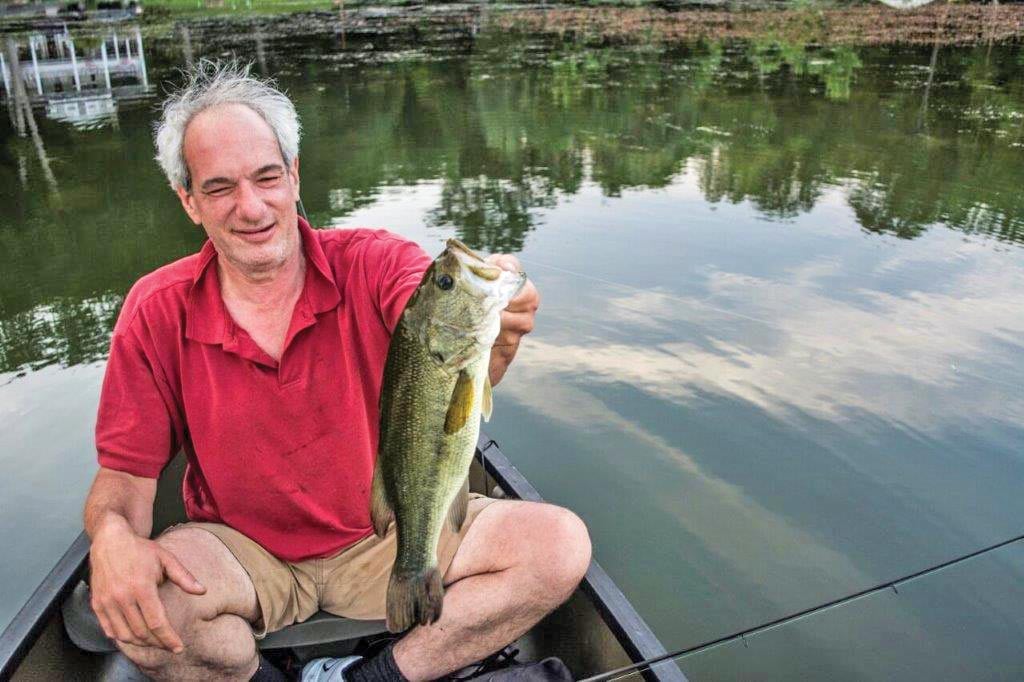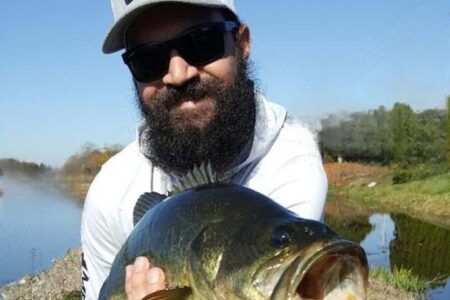
Not everyone can get on the water at first light. At least in my experience, it’s easier to fish into dusk, than it is to get out of bed before 3 a.m. and take advantage of equal darkness. During July and August, you’ll find action predictable in the evenings.
I don’t recall a single outing in more than a decade when the bass didn’t turn on for at least 10 minutes around sunset. I mention so short a time, because sometimes I’ve enjoyed all the action that quickly, but usually the bite intensifies for about 20 minutes, and then slows, although I often manage to catch some more before packing out under darkness.
The onset of a bite is unpredictable. Sometimes it begins before the sun has set, although usually it begins shortly thereafter. Once the rays angle low, chances of hooking up increase, but you’ll notice definite periods of action—bites—if you fish evenings repeatedly. It becomes as clearly identifiable with experience as a flock of birds breaking into song.
The biggest bass will likely come, as well as the most. You’ll want to get a camera out for a big one, but it’s a good idea to snap photos quickly, because the bite won’t last long. My friends and I especially fish small North Jersey lakes, usually beginning a summer outing in the middle of a hot afternoon. We catch bass under direct sun and usually some good ones, but I’ve noticed a tendency exemplified by one outing a couple of years ago. I caught three bass during the afternoon, not one of them over a pound. After sunset, I caught three more in 10 minutes—4 pounds, 2-1/2 pounds, and 2 pounds. Not like a bluefish blitz by any measure, but deeply satisfying after long, slow hours. On another occasion with my son and a friend of his—the three of us cramped in a 12-foot boat—we caught about 20 bass, almost all of them coming very quickly, and although the typical evening bite doesn’t result in that many, my son and I feel set for life by the pleasures we have taken from bites, after scorching heat makes full daylight feel oddly lonely.
What’s to throw when bass feed? “Go-to” has become a powerful catch phrase, pun intended. You might forget you have options, if your go-to gets in the way. Virtually everyone’s favorite for an evening bite is a topwater plug. Whatever the differences between them—popper, commotion plug, walker—a surface plug is something the bass can see when it makes ripples on a calm surface, and it’s sure to draw strikes so long as you fish among weeds or other shallow cover. But we’ve scored very well with the same unweighted plastic worms we offer bass under the sun.
The retrieve is not always as shallow as we normally fish topwaters. Last summer, my son and I caught most of our bass during an evening bite in 10 feet of water, just beyond a shallow weedy flat where it slopes down to about 20 or 25 feet of water. We felt thrilled to see our Power Pro braid stretched over the calm surface, suddenly twitching to life and slowly moving off, a feeling just as rewarding as seeing a bass explode on my favorite Rebel Pop-R.
Would they have hit a Rebel over water that deep? I think likely so, because the water was clear. But why would we bet on a likelihood admitting of more doubt than certainty, when we hooked up repeatedly on the worms? I’ve caught plenty of smallmouth bass while fishing surface plugs on top of 12 feet of water, but smallmouths are a more aggressive species than largemouths. Rather than limiting your largemouth options to shallows of 3 to 6 feet or so when the sun gets low, keep in mind that bass may be feeding among weeds as deep as 12 feet. You can always bet on those shallows and your topwater plugs to stir up action, but at least on some occasions, you may do even better by slyly letting an unweighted worm drop in slowly where a bass doesn’t have to swim far to engulf it.


